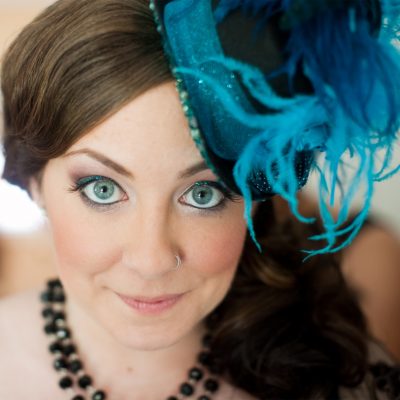Student Spotlight: Jenny Leigh Du Puis

February 24, 2020
Jenny Leigh Du Puis is a doctoral student in fiber science and apparel design from Leominster, Massachusetts. After earning her undergraduate degree at Lasell University and working in circus and theatrical costume design, she chose to pursue further study at Cornell due to its support, resources, and opportunities.
What is your area of research and why is it important?
I research the safety and functional design elements of attire for extreme physical performance in the circus arts. These performers are artist-athletes with specialized safety and functional needs for their clothing such as mobility, support, and protection, which may involve physical interaction with other people such as in acrobatics, or with an apparatus, likely while suspended in the air. The research is important because these are people who train and condition their bodies to perform skills and athletic feats, and the clothing that they wear must meet specific demands to protect the body, provide support, and enable movement without hindrance.
What are the larger implications of this research?
The larger scope of the work encompasses functional apparel design for anyone who engages with any kind of extreme range of motion, interaction with apparatus, or athletic training. For example: understanding the functional clothing needs for extreme environments such as outdoor rescue teams wearing harnesses, or those in high-endurance fields needing extra support or mobility from their garments. It is my intent to create a pool of resources for not only the circus world but also the apparel design industry and academia, so that we can have accurate information at hand to better design garments for people engaging in a range of physically demanding situations.
What inspired you to choose this field of study?
Prior to returning to academia, I worked for 10 years as a circus and theatrical costume designer and technician for regional, corporate, and touring productions such as Cirque du Soleil’s KÀ and Circus Smirkus, among many others. Working with circus artist-athletes revealed the specific functional needs that go into the clothing they wear while training and performing – their physically demanding skills necessitate special attention to protection, support, and mobility, all while meeting the aesthetic needs of the performance. Combining my extensive experiential knowledge in the field with my functional apparel design studies enables me to approach the research from both an industry and academic standpoint.
Can you speak about your work with the Office of Engagement Initiatives (OEI)?
With OEI’s support, I spent my winter break in Sarasota, Florida, the heart of traditional circus in the U.S. I conducted extensive historical research at The John and Mable Ringling Museum Archives and engaged with their staff and volunteers (many of whom are retired circus performers). I also attended an induction ceremony for the Circus Ring of Fame, an annual celebration of greats in the community. Finally, I was able to spend time in the Ringling Brothers and Barnum & Bailey Circus costume storage at FELD Entertainment, Inc., where I researched the history of circus costumes by analyzing the physical garments and interviewing staff.
What did this support allow you to do that you might not have otherwise been able to?
This support permitted me to travel to Florida and covered my housing and meals for the duration of my research trip. Without it, I would only have been able to conduct research from afar. While there is merit to phone/video interviews and the use of online archives, the benefits of immersion and engagement with the community there provided me with the kind of experiences and opportunities one can only find in person. I was able to make lifelong connections and re-immerse myself into the circus community, which is an integral part of my own life as both a participant and a researcher.
What are your hobbies or interests outside of your research or scholarship?
I make costumes! The more sparkly and fun the better. I lived in Vegas for eight years and return at least once per year to visit friends and attend a massive electronic dance music festival, EDC. Additionally, my husband travels for work as a stagehand on one of the Hamilton tours, so I frequently voyage out to see him with our elderly cat in tow. Finally, I have a goal of learning at least three circus skills before I graduate, so I take lessons at Circus Culture in downtown Ithaca – am currently learning to walk on a tightwire!
Why did you choose Cornell to pursue your degree?
Cornell offered me the opportunity to pursue my research with a world-class faculty and cohort, and the support I receive from my advisor and committee is essential to my success. In addition to the opportunities and benefits of the amazing support system in place, it is also possible (and encouraged!) to work with the community. What better place for a mature student who is also a circus costume designer to be able to study functional apparel design, have the full support of her committee, AND have access to a wealth of opportunities and resources? There is no question, Cornell is the perfect place for me.
